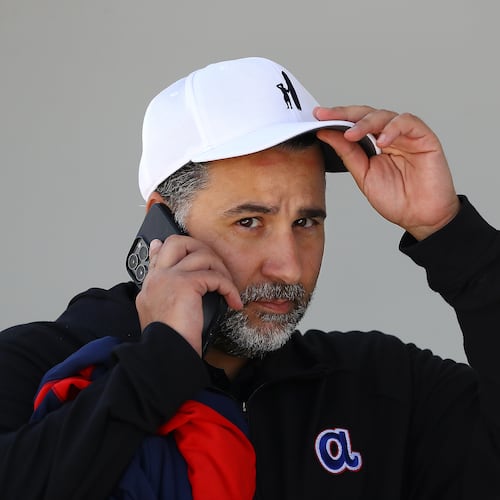Last weekend, the Braves inducted Terry Pendleton into their team Hall of Fame. It was a tremendous and well-deserved honor for an individual who played a substantial role in changing the Braves’ fortunes.
Pendleton’s first Braves team went worst to first in 1991, igniting the 14-year division run that’ll be hard to top for the rest of baseball history. He spent 4-1/2 years in Atlanta, but they were as meaningful a near half-decade can be.
“To do 14 (consecutive division titles) is something special. To be the start of that 14 is even more special,” Pendleton said.
I could rattle off numbers, eye-popping metrics that represented how exceptional Pendleton was. And not just him, of course. Those Braves teams were loaded. Stacked with Hall of Famers from the front office to the dugout to the diamond. But this isn’t a video game. Pendleton and others’ influence can’t entirely be measured in numbers.
Whenever Chipper Jones and other Braves legends speak on Pendleton’s behalf, it’s apparent he helped change the culture. The recurring theme isn’t to reference gaudy numbers, but instead the man himself, and what he meant toward building the right “culture.” That word is admittedly overused in sports, and when it is referenced, we often fail to identify what that entails.
I don’t have a textbook definition. Truth is, it can only be defined by those experiencing it. For as much access as the scribes have, we can pick up only parts of it. Whenever we step into a clubhouse, the atmosphere is evident after a few moments. Obviously you have a better feel for the team you’re covering, but as involved as we might be, you don’t get the full scope.
Culture, as those more privy seem to identify it, includes an expectation to win – not a hope or aspiration, but a demand – and an earnest passion for the organization and game itself. It stems beyond nine innings or workouts beforehand. It requires a franchise in sync, creating an environment conducive to player development, able to extract the maximum from veterans and have the correct mix of personalities.
When that’s achieved, there’s an osmosis effect. Pride, enthusiasm and devotion seems to bleed through the building. Outside a couple blips on the radar, the Braves have been lauded for their culture since the early ’90s. We’ve seen franchises in every sport that clearly lack that distinction, where losing takes reign and any “family” vibe seems lost. It is extremely difficult to re-establish it.
The Braves easily could’ve lost their way. They dropped 90 or more games in three consecutive seasons. Players came in and out like the franchise was a fast-food joint. Their front office – well, you know what happened there.
It’s remarkable, really, that the Braves maintained such strong culture. It’s been fair to criticize the team in recent years, and even now as they don’t dip heavily into free agency, but the environment they cultivated deserves praise. Look no further than other professional sports franchises in Atlanta to see how challenging building and maintaining winning culture can be.
There are players the Braves decided against pursuing for those reasons. Their two additions, Josh Donaldson and Brian McCann, have lengthy histories with successful organizations. It’s not lost on the players.
“They wouldn’t bring somebody in here (who’d interfere with the clubhouse culture),” shortstop Dansby Swanson said. “They wouldn’t bring personalities in here that’d take away from what we have. I think everyone here trusts the front office enough to know they’re only going to put people in here who’ll enhance what we have, not take away.
“Whenever you’re experiencing (players who have been) around winning culture, not only is that your expectation for the team, but it allows you to take tidbits from each about what worked, what didn’t work, what could work here. It allows things to go in the right direction.”
Donaldson helped revitalize the Blue Jays. Braves general manager Alex Anthopoulos, who acquired Donaldson as Toronto’s lead man, spoke often about needing a tougher mentality that the eventual MVP provided.
McCann was ushered in as a Baby Brave, eventually spending time with the Yankees and Astros, two of the more successful franchises in recent years. Even the Braves players who are less familiar with McCann respect him. They’ve heard the stories, seen his professionalism and dedication to the game in which they hope their careers can be any similar length.
“You can tell it’s contagious,” utilityman Charlie Culberson said of McCann’s mentality. “The Braves did that right. To bring him back home, yes, but there’s a lot more to that, too.”
Indeed, there’s a lot more to it. More than we’ll ever know, but not more than we’ll observe. The ’90s Braves taught us that, and these Braves will attempt to recapture that sustained excellence - and the immeasurable ingredients it contains.
About the Author
The Latest
Featured



